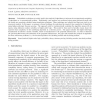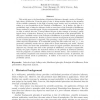1300 search results - page 177 / 260 » Probabilistic logic with independence |
JCST
2010
13 years 2 months ago
2010
Probabilistic techniques are widely used in the analysis of algorithms to estimate the computational complexity of algorithms or a computational problem. Traditionally, such analys...
NC
2008
13 years 7 months ago
2008
A highly desired part of the synthetic biology toolbox is an embedded chemical microcontroller, capable of autonomously following a logic program specified by a set of instructions...
SYNTHESE
2008
13 years 7 months ago
2008
This article goes to the foundations of Statistical Inference through a review of Carnap's logic theory of induction. From this point of view, it brings another solution to t...
KDD
2003
ACM
14 years 8 months ago
2003
ACM
We describe techniques for combining two types of knowledge systems: expert and machine learning. Both the expert system and the learning system represent information by logical d...
AAAI
2010
13 years 9 months ago
2010
Recent research has shown that surprisingly rich models of human behavior can be learned from GPS (positional) data. However, most research to date has concentrated on modeling si...


